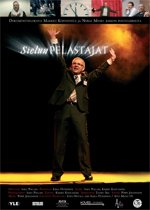Keisari ilman vaatteita II
Puheenvuoron toisessa osassa Pauwels kuvailee dokumenttien kulta-aikaa ja kuinka vielä kymmenen vuotta sitten toimineet tuotantomallit ovat aikansa eläneet. Tuottajien on ymmärrettävä, että aika on aivan toinen.
Analysing the information I gathered while listening to your colleagues and the commissioning editors at some recent pitching sessions I was reminded of a message that a general of the first world war sent to the french government just before launching one of his most murderous attacks: to the left my army is under heavy attack by forces much stronger than anticipated; the right flank is under extremy pressure and might not be able to hold it’s position, thereby endangering us all, the rear lines are breaking up under constant enemy fire which might expose my army to the enemy’s full force… in brief…these are excellent conditions. I will now attack!
The result was 300.000 dead. The battle was lost, but in the end the war was won.
Let it be clear; I despise generals, I have no admiration for whatever armed conflict, but there might be a lesson to be learned here for us all: when in danger, don’t duck and hide, but be pro-active. Attack!
The old models have died: be inventive or disappear.
To develop my first point I have to take you an a tour down memory lane.
Life was easy life back in the early nineties when production rules where clear and simple. There were not many independent production companies around. Documentaries were very often fully financed but also the full retention of rights by the commissioning broadcaster was quite normal. Knowing the right people at the right position was the most important skill a producer needed to possess.
The proliferation of commercial broadcasting in europe changed that situation. It’s no coincidence that the strongest documentary tradition came from those regions where commercial television was already present in a rather early stage.
The emerging competition forced the broadcasters to improve the quality and the originality of their slots. To achieve that goal they needed independent producers. New companies were created and many of them florished. They produced wonderful and strong documentaries. New subjects were being discovered, new forms of storytelling developped and new audiences found. Factual became popular. Being independent became hot.
The new market situation also stimulated a phenomenon that until then had mainly been reserved for fiction: international coproductions. Clever producers quickly took advantage of this new opportunity and started actively looking for partners abroad.
No longer money would come from one main national source but several investors would be combined to bring together enough money to produce a documentary that in form and content would reflect its international set-up.
I think it’s fair to say that in those days there was a genuine interest in what was going on outside the own borders. This was reflected in many slots on television that were now showing documentaries that were no longer strictly nationally produced. And it worked: the audience loved them.
At the same time many filmfunds started showing a growing interest to support documentary. You would be surprised how limited the possibilities were to get financial public support to produce documentaries in the eighties. In my own country, belgium, it wasn’t until ’92 that documentary projects became eligible for subsidy. This improved support for factual projects would become a major factor in the successful economic development of many a Eropean production company.
I’m not going to spend much time on talking about the Eeuropean support that for the first time was made available through the european commission’s media plan. I know it’s a much debated support scheme that some consider to be complicated and even unfair, but i’ve always been a strong supporter of the whole idea. I believe that many excellent documentaries would never have been made without this support and many production companies that exist today would never have been able to survive without media’s financial input.
----
I was lucky enough to develop my activities exactly in the period when european coproduction was really developing and money was available; when the broadcasters, the film institutes and the politicians in charge of media and culture budgets started taking documentary serious.
And then… there were the commissioning editors. In those far-away days they were really powerful people who had their own strand and slots to fill and had power. They would be the ones who took the decisions and their word would be good as gold (well, in most cases at least, sometimes promises turned out to be fools gold…). They were also limited in number. If you knew thirty people you more or less covered the entire european broadcasting world involved in international coproductions.
And to complete the picture of those golden days, television was about your only client and a relatively well paying client too. Contracts were simple, two or three pages would do and a child could understand them. Broadcasting waves seemed to stop at the border and the whole tights situation was generaly simple.
Can you see the picture coming together?
Hell, even I could create a production company in such circumstances and turn it into a succes.
Would I be able to achieve the same result today? I very much doubt it. Most of the elements that made life easy 20 years ago recently seem to have been turned into threats, more than into opportunities.
It’s a completely different world out there and I am convinced that if I would try to set up a company today with the same business management background that I had 25 years ago, I would fail miserably. The old model does not function anymore!


